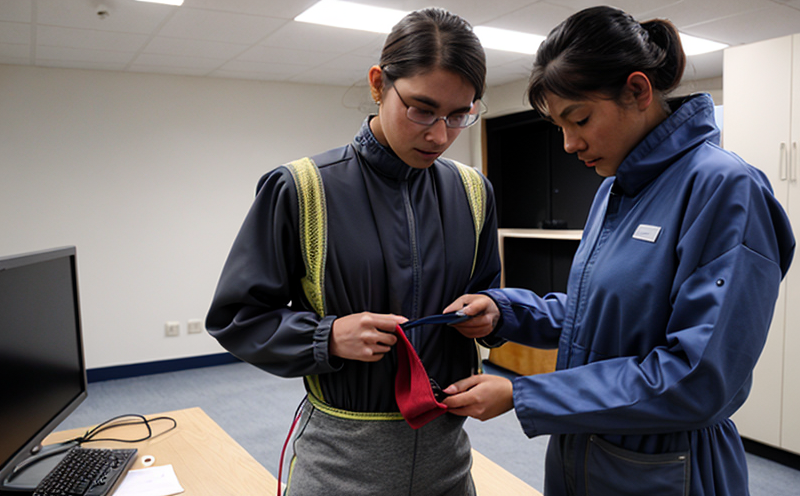OEKO TEX Certification testing of medical textiles
The OEKO TEX Standard 100 is an internationally recognized certification that ensures textiles are free from harmful substances. When it comes to medical textiles, this certification plays a crucial role in ensuring patient safety and the quality of care provided by healthcare professionals.
Medical textiles include a wide range of products such as surgical gowns, drapes, caps, masks, face shields, gloves, and bandages. These materials must be not only functional but also safe for human contact. OEKO TEX testing ensures that these textiles comply with the strictest health and safety standards.
The testing process involves several stages, including sample preparation, chemical analysis, physical testing, and microbiological examination. Samples are taken from the medical textiles and analyzed to ensure they meet the required criteria for freedom from harmful substances such as formaldehyde, heavy metals, azo dyes, and carcinogenic or mutagenic substances.
Chemical analysis is performed using advanced laboratory techniques that can detect even trace amounts of harmful chemicals. Physical testing assesses factors like strength, abrasion resistance, and breathability to ensure the textiles perform their intended functions effectively. Microbiological examination ensures the products are free from bacteria, fungi, viruses, and other pathogens.
The testing process is governed by international standards such as ISO 10993-1, which covers biocompatibility requirements for medical devices. Compliance with these standards provides assurance that the textiles will not cause adverse reactions when used in medical applications.
OEKO TEX certification is a key differentiator for medical textile manufacturers and suppliers. It builds trust with healthcare providers who can be confident that the products they use are safe and reliable. For quality managers, compliance officers, R&D engineers, and procurement teams, OEKO TEX testing offers a comprehensive solution to ensure product safety and regulatory compliance.
By undergoing this certification process, medical textile manufacturers can enhance their brand reputation and gain competitive advantage in the global market. The rigorous testing protocols ensure that only the highest quality products reach the healthcare sector, contributing to better patient care and safer environments for both patients and staff.
Industry Applications
- Surgical gowns and drapes
- Caps, masks, face shields
- Gloves
- Bandages and wound care products
- Incontinence pads and absorbent materials
Why Choose This Test
Selecting OEKO TEX certification for medical textiles is a strategic decision that offers numerous advantages. The test ensures that all components of the textile are free from harmful substances, which is critical in healthcare settings where patient safety is paramount.
The rigorous testing process covers not only chemical safety but also physical and microbiological aspects. This comprehensive approach helps manufacturers meet stringent regulatory requirements across different countries and regions. For instance, compliance with OEKO TEX ensures that products are suitable for use in the European Union, which has some of the strictest regulations in place.
Choosing this certification also enhances brand reputation and customer trust. Healthcare providers prefer suppliers who demonstrate a commitment to quality and safety. By achieving OEKO TEX certification, manufacturers can differentiate themselves from competitors and build stronger relationships with their clients.
The test results provide detailed reports that document the compliance status of each product. These reports are invaluable for quality control departments and R&D teams looking to continuously improve product performance and safety. Additionally, the certification process encourages innovation by identifying potential areas for improvement in textile design and manufacturing processes.
In summary, OEKO TEX certification is essential for medical textile manufacturers who want to ensure their products meet the highest standards of safety and quality. The certification provides peace of mind for both manufacturers and healthcare providers, ensuring that patients receive safe and effective care.
Use Cases and Application Examples
In a hospital setting, surgical gowns and drapes must be free from harmful chemicals to prevent the spread of infections. OEKO TEX testing ensures these textiles do not contain formaldehyde or other potentially carcinogenic substances that could harm patients during surgery.
Caps and masks used in operating rooms are subject to stringent requirements due to their close contact with patients. OEKO TEX certification guarantees that these products meet the necessary standards for chemical, physical, and microbiological safety.
Gloves worn by healthcare workers must be durable yet comfortable, offering good grip while providing protection against contaminants. OEKO TEX testing ensures gloves are made from materials that do not cause irritation or allergic reactions when in prolonged contact with skin.
Bandages and wound care products need to adhere securely without causing discomfort or adverse effects on the skin. OEKO TEX certification verifies that these products meet all relevant safety criteria, ensuring they perform their intended functions effectively.
Incontinence pads are crucial for patient comfort and dignity, especially in long-term care facilities. OEKO TEX testing ensures these absorbent materials do not contain harmful substances that could irritate sensitive skin or cause infections.





